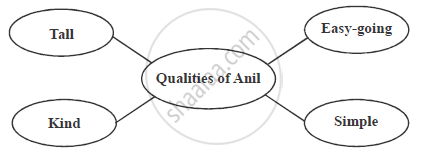Advertisements
Advertisements
प्रश्न
Read the following passage and do the activities:
A1. Choose the correct alternatives from the given options and rewrite the sentences :
(appealing, casually, flattery, well-oiled) (2)
(1) I followed ….........
(2) Anil talked about the ….........wrestlers.
(3) I gave him my most ….........smile.
(4) A little …......... helps in making friends.
I was still a thief when 1 met Anil. And though only 15, was an experienced and fairly successful hand.
Anil was watching a wrestling match when I approached him. He was about 25 — a tall, lean fellow — and he looked easy-going, kind and simple enough for my purpose. I hadn’t had much luck of late and thought I might be able to get into the young man’s confidence.
“You look a bit of a wrestler yourself,” I said. A little flattery helps in making friends.
“So do you,” he replied, which put me off for a moment because at that time I was rather thin.
“Well, I said modestly, “I do wrestle a bit.”
“What's your name ?”
“Hari Singh,” I lied. I took a new name every month. That kept me ahead of the police and my former employers.
After this introduction, Anil talked about the well-oiled wrestlers who were grunting, lifting and throwing each other about. I didn't have much to say. Anil walked away. I followed casually.
“Hello again,” he said.
I gave him my most appealing smile. “I want to work for you”. I said.
“But I can't pay you.”
I thought that over for a minute. Perhaps I had misjudged my man. I asked, “Can you feed me ?”
“Can you cook ?”
“I can cook,” I lied again.
“If you can cook, then may be I can feed you.”
He took me to his room over the Jumna Sweet Shop and told me I could sleep on the balcony. But the meal I cooked that night must have been terrible because Anil gave it to a stray dog and told me to be off. But I just hung around, smiling in my most appealing way, and he couldn’t help laughing.
A2. Complete the following web-chart: (2)

A3. Find the similar meaning words from the passage for the following : (2)
(1) endearing
(2) miscalculated
(3) humbly
(4) awful
A4.
(1) “I want to work for you,” I said. (1)
(Change it into indirect speech)
(2) I can’t pay you. (1)
(Rewrite making it affirmative)
A5. “We should learn from our own mistakes.” Explain. (2)
उत्तर
A1
(1) I followed casually.
(2) Anil talked about the well – oiled wrestlers.
(3) I gave him my most appealing smile.
(4) A little flattery helps in making friends.
A2
A3
(1) appealing
(2) misjudged
(3) kind
(4) terrible
A4
(1) I said that I wanted to work with him.
(2) I refused to pay.
A5
We need to learn from our mistakes so that we do not run the risk of repeating them. We must develop the wisdom and sense to make good decisions and choices. If you have a difficult time making decisions or always blame your bad outcomes on others, then you have not learned anything.
We should forget our mistakes and more on but never forget what it taught you. Take your mistakes as learning and try to improve it.
APPEARS IN
संबंधित प्रश्न
Who does ‘I’ refer to in this story?
What does he get from Anil in return for his work?
Does Anil realize that he has been robbed?
Complete the given sentence.
Anil didn’t hand Hari over to the police _______.
Think and write in your own words, in your notebook.
Why did Anil employ Hari as a cook, although he could not afford to pay him?
Think and write in your own words, in your notebook.
Why didn’t Anil hand over Hari to the police? What effect would it have had on Hari?
Think and write in your own words, in your notebook.
What tact had Anil used to change Hari’s dishonest ways?
Write a character sketch of ‘Hari Singh’ with the help of the following points, using the paragraph format.
- Hari Singh's background
- His dishonesty
- His aspirations
- His courage to change himself
A character arc is the transformation or development of a character throughout a story and refers to the changes a character undergoes as a result of their experiences, challenges, and interactions with other characters.
In the light of the above information, trace the character arc of the thief in Ruskin Bond’s The Thief’s Story, in about 120 words.
Answer the following in about 100-120 words:
Trust and compassion can reform a person. Justify this statement in the light of the lesson 'The Thief's Story'.
